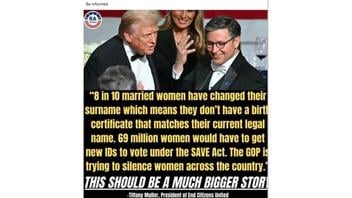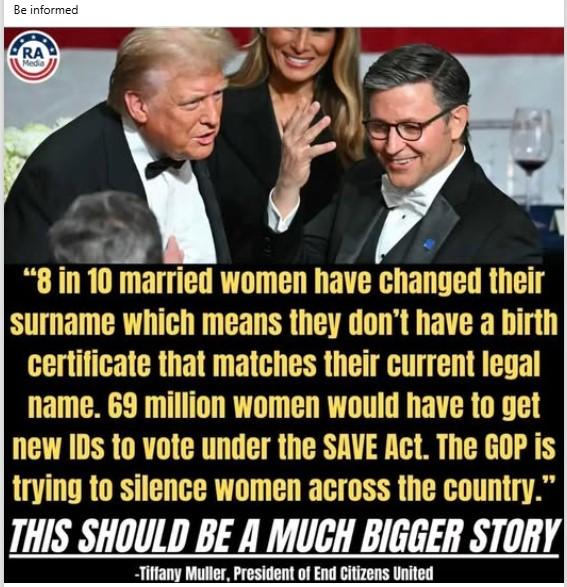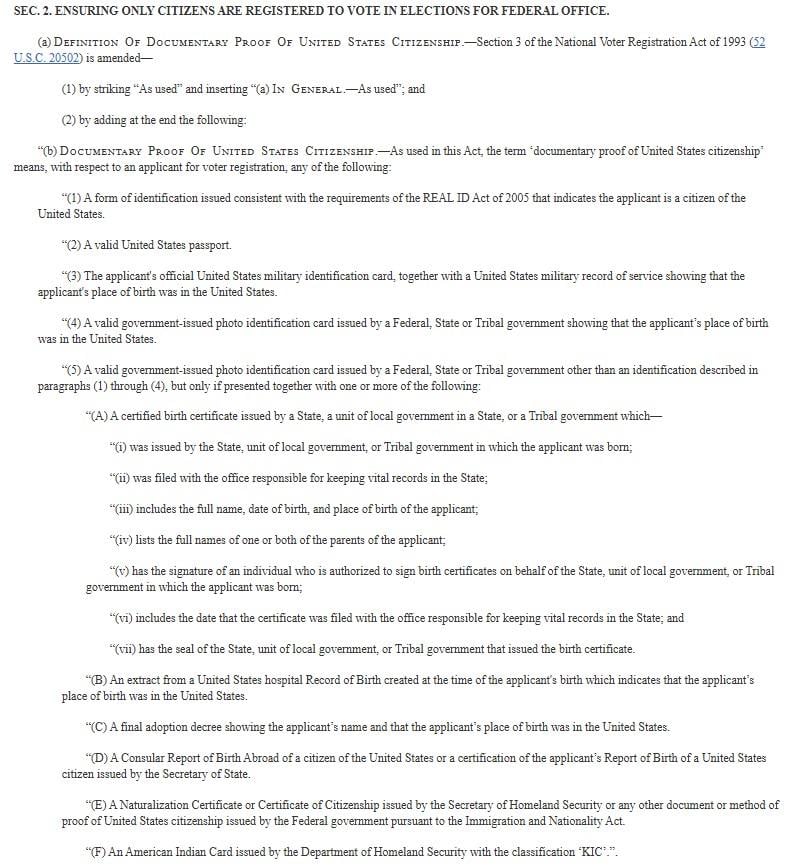
If the 2025 draft of the Safeguard American Voter Eligibility (SAVE) Act is enacted, will 69 million married American women be unable to vote without getting a new official ID, as opponents have said on social media? The bill aims to prevent non-citizens from voting by requiring in-person registration with citizenship and ID documents in hand. SAVE Act sponsors say millions of already-registered women voters would not be affected. But, researchers at the Center for American Progress say U.S. Census Bureau data show that tens of millions of women in opposite-sex marriages have changed their names and would be unable to use their birth certificate to prove they are eligible to vote. That doesn't necessarily mean they won't be able to vote, but it may mean registering will be harder.
The claim is found in a variety of social media posts, including this April 9, 2025, Facebook post (archived here) under the title "Be informed". It opened:
8 in 10 married women have changed their surname which means they don't have a birth certificate that matches their current legal name. 69 million women would have to get new IDs to vote under the SAVE Act. The GOP is trying to silence women across the country.
This is what the post looked like on Facebook at the time of writing:
(Source: Facebook screenshot taken on Mon Apr 14 22:15:59 2025 UTC)
SAVE Act imposes new requirements on voter registration.
At issue are the bill's proposed tougher standards for voter identification, shown here in the archived April 21, 2025 version of the bill found on Congress.gov:
Opponents of the law say requiring in-person registration with citizenship documents in hand will make it impossible or at least more difficult for millions of women to vote, since so many take their husband's name when they marry. This is because the birth certificate that proves their citizenship will not match the name on their driver's license or other standard government-issued ID. SAVE Act opponents say the bill will similarly block voter registration for millions of widows and divorced women who took their husband's surname and have not changed back to their birth name.
A week in advance of publication, Lead Stories reached out to the press office of the bill's sponsor, Rep. Chip Roy, R-TX and will update this fact check when he responds directly.
In an April 16, 2025, press release on Roy's website (archived here), he said millions of married women who changed their names are already registered to vote and are therefore unaffected by the SAVE Act rules, "The so-called '69 million married women' figure is a statistical sleight of hand meant to purposefully ignite fear and conveniently glosses over this critical fact."
The Roy press release said the SAVE Act tells state governments to establish processes to allow registration of those whose documents don't match up:
For the small fraction of individuals who have not updated their documentation to reflect a name change -- though most do so quickly for general life purposes such as an I-9 form for employment, passport to travel, and Social Security card for taxes -- the SAVE Act explicitly directs states to establish a process allowing them to register to vote despite a name discrepancy. The SAVE Act specifically left this to the states because name-change procedures are governed by state law ...
How opponents calculate 69 million women's documents won't work.
A 2023 Pew Research Center study (archived here) of marriage in America found that 79% of women in opposite-sex marriages take their husband's name, plus 5% of men in opposite-sex marriages take their wife's last name.
Gréta Bedekovics, co-author of the Center for American Progress study of the SAVE Act's impacts (archived here), wrote in an April 16, 2025, email to Lead Stories that the Pew findings plus U.S. Census data (archived here) show the problem. She said she included currently married women and widowed female citizens, as many do not change back their surname to their maiden name.
84% of that alone, given that widows do not typically revert to their birth name, accounts for approximately 68 million women who have married and taken their spouse's name and likely do not have a matching birth certificate. Additionally, there are 15.1 million divorced women reported in there as well. That brings the groups of all women who have married up to 95.8 million.
Even when accounting for none of the divorced women, many of whom will not have gone through the legal process of reverting their name, we are still left with a figure of currently married and widowed women that is consistent with our report. If you were to factor in all of the divorced women, you will find that is approximately 80 million women who have married -- quite a bit more than what is reported in our "as many as 69 million" figure.
Unclear degree to which passports mitigate the problem.
Independent data appears to corroborate Bedekovics' findings about the number of voting age Americans who have changed their name in marriage, but it is not possible to precisely document how many women with birth certificate mismatch hold a passport that would solve the problem of proving citizenship.
The State Department estimated in 2023 that 48% of Americans hold a passport.
But, the department's statistics on passports (archived here) count a person with a passport book and a passport card twice, inflating the percentage. Plus, Americans under voting age are included in its numbers. The gender breakdown of passport holders isn't available on the State Department's data site, even though passports do note gender. Despite the State Department's estimate, USA Facts, a non-partisan independent compiler of government data, calculated that while there were about .48 passports per American (archived here) in 2023, that does not mean almost half of Americans have passports, because of the double-counting of passport card holders.
More Lead Stories fact checks on voter registration can be found here.

















